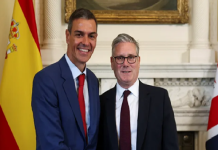ANKARA, Turkey (AP) – Turkish President Recep Tayyip Erdogan has expressed concerns about Sweden’s possible NATO membership, saying his country will pull out of an upcoming summit in Lithuania due to unresolved security issues, hence Turkey Cannot approve Sweden’s request earlier. Sweden and Finland submitted their applications for NATO membership last year following Russia’s invasion of Ukraine. While the Turkish parliament ratified Finland’s membership in April, Turkey has yet to approve Sweden’s bid.
NATO’s leadership aims to add Sweden to the alliance ahead of a summit of member states in the Lithuanian capital on July 11-12. Speaking to reporters while returning from an official visit to Azerbaijan, Erdogan stressed that Turkey’s stance on Sweden’s accession is not positive.
Reports by Turkey’s state-run Anadolu Agency and other media highlighted Erdogan’s remarks as senior officials from NATO, Sweden, Finland and Turkey met in Ankara for talks. The purpose of the meeting was to address Turkey’s concerns about alleged terrorist organizations and to review the actions of Finland and Sweden in response to these concerns.
The Turkish government accuses Sweden of being too soft on groups that Turkey considers a security threat, including militant Kurdish groups and those linked to Turkey’s failed 2016 coup attempt. In which an anti-Islam activist set fire to the Holy Quran outside the Turkish Embassy.
Swedish Prime Minister Alf Kristerson acknowledged the importance of the Ankara meeting and reiterated that his government had fulfilled its commitments as outlined in an agreement reached last year. The purpose of the agreement was to ensure Turkey’s ratification of Sweden’s NATO membership. However, Erdogan maintained his dissatisfaction with Sweden’s efforts, insisting that Sweden must address the actions of the Kurdistan Workers’ Party (PKK), a separatist group involved in an insurgency in Turkey.
Erdogan mentioned that pro-Kurdish and anti-NATO rallies were held in Stockholm during a meeting with NATO Secretary General Jens Stoltenberg in Istanbul. The Turkish delegation at the Ankara meeting was expected to convey Erdogan’s views, stressing that the outcome in the Lithuanian capital Vilnius would not deviate from Erdogan’s position.
A statement issued by the Turkish Presidency after the meeting confirmed that consultations were held on the activities of terrorist groups in Sweden based on concrete examples. The parties agreed to continue working together on further initiatives. Stoltenberg described the meeting as taking place in a constructive atmosphere, acknowledging some progress and vowing to work towards Sweden’s ratification as soon as possible. However, they could not guarantee Sweden’s entry before the Vilnius summit, as it would require the unanimous approval of existing NATO members.
Sweden’s envoy Oskar Stenström took the talks a step further but stressed there was still a long way to go. He highlighted the fierce fighting against the PKK and recent charges against an individual involved in extortion efforts by the outlawed group in Turkey.
Sweden’s NATO membership is dependent on the resolution of Turkey’s security concerns and the unanimous approval of all current NATO members. Sweden is likely to join the alliance at an upcoming summit in Lithuania, but the final decision is uncertain. As the talks continue, international attention remains focused on the outcome, which will shape the future of Sweden’s relationship with NATO and regional security dynamics in Northern Europe.
The ongoing debate surrounding Sweden’s potential NATO membership highlights the complex dynamics and challenges facing both Sweden and Turkey. President Erdogan’s concern about Sweden’s security measures and alleged leniency towards groups that Turkey considers a threat represent significant obstacles to Sweden’s entry into the alliance.
Turkey’s reluctance to accept Sweden’s NATO bid raises questions about the future of their bilateral relationship and Turkey’s role in the alliance itself. As a key member of NATO, strategically positioned between Europe and the Middle East, Turkey enjoys geopolitical importance. Its approval or disapproval of Sweden’s membership could shape coalition dynamics and decision-making processes.
One of the main points of contention is Sweden’s approach to dealing with the Kurdish problem. Turkey has been battling Kurdish rebels for decades and views the PKK as a terrorist organization. Erdogan’s insistence on Sweden to deal with PKK operations underlines the sensitivity of the issue for Turkey. On the other hand, Sweden may find it difficult to balance its commitment to human rights and freedom of expression with Turkey’s security concerns.
The situation has been further complicated by strained relations between Turkey and Sweden due to various incidents such as the Koran burning protests and demonstrations in Stockholm. These events have fueled mutual mistrust and reinforced Turkey’s concerns about Sweden’s suitability for NATO membership.
It is important to note that Sweden’s desire to join NATO stems from its concerns about Russia’s actions, particularly its invasion of Ukraine. As a non-aligned country for decades, Sweden’s potential membership signals a shift in its security strategy and a desire for closer cooperation with Western allies. The outcome of Sweden’s NATO bid will have implications for regional security dynamics in Northern Europe and could affect the overall balance of power in the region.
The Ankara meeting between NATO officials, Sweden, Finland and Turkey shows the importance of dialogue and negotiation in solving these problems. Although some progress was acknowledged, it is uncertain whether Sweden’s accession to NATO can be achieved before the Vilnius summit. Unanimous approval by all NATO members, including Turkey, is required, and it is unclear whether Turkey’s concerns will be fully addressed in time.
The international community will be keeping a close eye on developments surrounding Sweden’s NATO membership. This outcome will affect not only the relationship between Sweden and Turkey, but also the future direction of NATO and its engagement in Northern Europe. Finding a balance between security concerns, regional stability, and the principles of unity will be critical to reaching a resolution that satisfies all parties.





